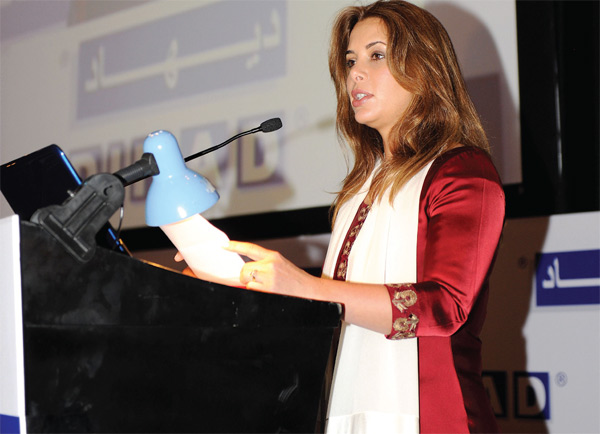
Dubai, April 2: Under the patronage of His Highness Shaikh Mohammed bin Rashid Al Maktoum, Vice-President and Prime Minister of the UAE and Ruler of Dubai, the Dubai International Humanitarian Aid and Development Conference and Exhibition (Dihad) was inaugurated on Sunday by the UN Messenger of Peace and Chairperson of the International Humanitarian City, Princess Haya bint Al Hussein, wife of Shaikh Mohammed, at the Dubai International Convention and Exhibition Centre.
Princess Haya was accompanied by Ibrahim Bumelha, Cultural and Humanitarian Advisor of Shaikh Mohammed, Vice-President of the Mohammed bin Rashid Al Maktoum Humanitarian and Charity Est., Chairman of the Higher Committee of Dihad and President of DISAB; Ahmed Humaid Al Mazroui, Chairman of the UAE Red Crescent Authority; William Lacy Swing, Director-General of the International Organisation for Migration (IOM); as well as a number of local and international figures also accompanied Princess Haya.
This year’s theme, ‘The Role and Importance of Youth in Humanitarian Assistance and Development Activities’, highlights the issues of youth in affected areas and the pursuit of providing them with development while implementing appropriate activities that will help them maintain the development process.
“Young people today have been raised in the digital age — they are accustomed to the fast movement of ideas, products and information, to instant gratification,” stated Princess Haya, who spoke at the opening ceremony.
“The pace of change in their daily lives has quickened and they are not patient. If I were a teenager or in my twenties today, I would be nervous, angry and frustrated.”
“People underestimate the capacity of youth,” continued Princess Haya. “How is it that we give them so little a role in setting the global development agenda or helping find new routes to ending political conflicts that deplete our energy and resources? Al Mazroui, in a speech delivered on behalf of Shaikh Hamdan bin Zayed Al Nahyan, Ruler’s representative in the Western Region and Chairman of the Red Crescent Authority, said: “The UAE stands at the forefront of the world’s key humanitarian players and it is committed to move forward with its approach that strengthen human ethics, rights and basic needs and put it at the forefront of our priorities. The UAE Red Crescent Authority follows the path of decency and generosity for the past three decades and we are keen to support the needy.”
In his speech, Ibrahim Bumelha said: “In the past nine years, Dihad has excelled in attracting the world’s key humanitarian executives and leaders to Dubai, providing a platform where they can share their expertise, express their opinions and contribute to solutions that would have major input in raising the standard of living. These solutions would target affected communities, building their capabilities and teach them how to respond quickly and more effectively during a crisis.”
As part of the programme, Princess Haya toured the exhibition.
“More than 275 exhibitors from 66 countries representing governmental and non-governmental organisations are participating in the Dihad exhibition this year,” said Dr Abdul Salam Al Madani, Executive Chairman of Dihad Conference and Exhibition and President of Index Holding.





Comments
Add new comment